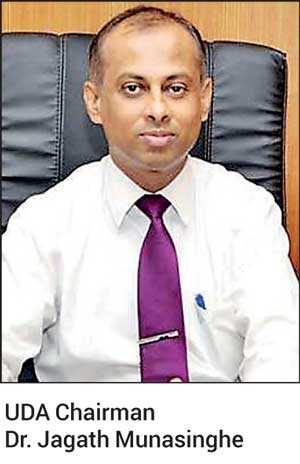Monday Feb 16, 2026
Monday Feb 16, 2026
Saturday, 2 March 2019 00:42 - - {{hitsCtrl.values.hits}}
 By Chathuri Dissanayake
By Chathuri Dissanayake
The Urban Development Authority (UDA) will make the Green Building Certification for all private property development compulsory within the next five years, Chairman Dr. Jagath Munasinghe said.
The certification, which was introduced in 2017, is now compulsory for all Government sector constructions, but the UDA is now drawing up plans to extend the regulations to all private sector development in the coming years.
“The certification is now given to all Government buildings, and we plan to extend the same regulations to the private sector as well. The developers will have to then work on getting the certification which will have assessments at different levels of constructions,” Dr. Munasinghe said.
The move is a step towards turning Sri Lankan cities and township into green cities, Dr. Munasinghe said, speaking at the press briefing held to announce the World Renewable Energy Conference, set to be held in Colombo in September.
The certification has four different levels: Platinum, Gold, Silver, and Certificate, which can be awarded through an assessment system.
“Buildings will be given marks under different categories, with those who earn 80 or above marks being awarded platinum green certificate. To obtain at least a certificate level - the lowest in the four green certification categories - developers need to earn 40 marks given under different components,” Dr. Munasinghe said.
The assessment will look at a number of different areas for marking, including selection and management of the site, construction process to assess how eco-friendly practices are, and materials usage and design components, such as energy utilisation in the building. Further, the construction will also be assessed based on utility usage, to assess how resources such as water are used and recycled.
“We will assess how the builder uses material to see if the minimum necessary is used in the best and most efficient way, and will check if the appropriate materials are used, or if unnecessary materials are being used,” he said.
Once implemented, all property developers will have to register for a Green Building Certification when they file for the building application. The assessment will then be carried out by officers of the UDA, or relevant local body, throughout different stages in the construction.
The final certification will be issued with the Certificate of Conformity before the building can be occupied, Dr. Munasinghe explained.
The UDA has already carried out awareness programs for the Government sector, in order to help officials who are responsible gain an understanding about the green building concept.
“We have trained staff from different Government agencies, especially those which have large building stock coming in, such as Health and Education ministries,” he said.
The UDA is also planning to carry out awareness on the green cities concept to different communities to ensure compliance.